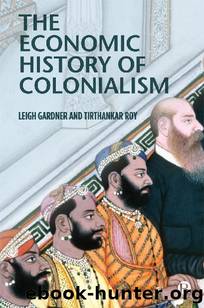The Economic History of Colonialism by Leigh Gardner & Tirthankar Roy

Author:Leigh Gardner & Tirthankar Roy [Gardner, Leigh & Roy, Tirthankar]
Language: eng
Format: epub
Publisher: Bristol University Press
Published: 2020-07-15T00:00:00+00:00
Conclusion
This chapter uses systems of taxation and public spending to understand the changing capacities and constraints facing colonial states. Expectations that colonial governments would at least mostly be self-sufficient placed tremendous pressure on them from the beginning to collect sufficient tax revenue to cover the local expenses of conquest, administration and any programmes of economic development. It also restricted their administrative and coercive capacity, forcing them to rely to varying degrees on indigenous institutions and other intermediaries, creating a system of hybrid and de jure forms of governance characterized by considerable diversity both within and between different colonies.
Assessments of how successful colonial states were in raising taxes vary. However, it is universally true that local economic and political conditions dictated what could be taxed and when. Where possible, colonial governments tended to favour taxes that were easier â administratively and politically â to collect, particularly taxes on trade. Where these were sufficient to pay the local expenses of the government, they represented an often substantial share of total revenue. Where they were not, however, a variety of direct taxes on incomes, land and production were required to supplement the stateâs income. These were collected in ways that reflected both the limitations of the colonial state, as well as the resources of the colony in question, and their precise structure was often heavily influenced by local interests of various kinds. Lack of formal political voice did not always mean lack of influence.
Tax systems and the revenue they produced determined the possible range of expenditures. In most colonial states, budgets were characterized by high levels of spending on administration, dictated in large part by exorbitant (in local terms) salaries for European civil servants, and infrastructure. The latter constituted the primary means by which colonial governments sought to expand the tax base. Most spent little on developing the human capital of indigenous populations, though this varied to some extent across space and to a greater extent over time.
The development of colonial fiscal systems illustrates that colonial states were the product of a âcomplex historical processâ, rather than being the sole creation of either imperial bureaucrats or economic interests (Lonsdale and Berman 1979: 487). Financial dependence on local taxpayers meant that colonial institutions had to be, at least to some degree, responsive to their demands in the implementation of colonial policies. For taxpayers, the experience of colonialism â extractive, developmental or minimalist â would have varied enormously even within individual colonies. Finally, financial constraints and considerations shaped the ways in which colonial states performed other institutional functions, which are the subject of the next chapter.
Download
This site does not store any files on its server. We only index and link to content provided by other sites. Please contact the content providers to delete copyright contents if any and email us, we'll remove relevant links or contents immediately.
| Africa | Americas |
| Arctic & Antarctica | Asia |
| Australia & Oceania | Europe |
| Middle East | Russia |
| United States | World |
| Ancient Civilizations | Military |
| Historical Study & Educational Resources |
The Third Pole by Mark Synnott(949)
Money for Nothing by Thomas Levenson(941)
The Economist (20210109) by calibre(933)
Christian Ethics by Wilkens Steve;(854)
Made in China by Anna Qu(849)
The Age of Louis XIV: The Story of Civilization by Will Durant(817)
Nonstate Warfare by Stephen Biddle(810)
Reopening Muslim Minds by Mustafa Akyol(802)
100 Posters That Changed The World by Salter Colin T.;(781)
Culture by Terry Eagleton(770)
The Shortest History of China by Linda Jaivin(765)
The Great Pyramid Void Enigma by Scott Creighton(756)
The Irish Buddhist by Alicia Turner(751)
Routledge Handbook of Contemporary India by Knut A. Jacobsen(736)
Ideology by Eagleton Terry;(731)
Sybille Bedford by Selina Hastings(686)
The Jews of Silence: A Personal Report on Soviet Jewry by Elie Wiesel(675)
Banaras: CITY OF LIGHT by Diana L. Eck(674)
Objects of Vision by Saab A. Joan;(665)
